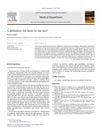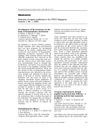 1 citations
,
December 2017
1 citations
,
December 2017 The study suggests that treating early hair loss with Nourkrin® with Marilex® can help prevent further hair loss and may be linked to reducing the risk of lifestyle diseases.
 30 citations
,
September 2017 in “Clinics in Dermatology”
30 citations
,
September 2017 in “Clinics in Dermatology” Men with common hair loss may have a higher risk of heart disease and diabetes, and should be checked for these conditions.
 5 citations
,
September 2016 in “Journal of Cosmetic Dermatology”
5 citations
,
September 2016 in “Journal of Cosmetic Dermatology” Nourkrin® with Marilex® may increase hair count by 35.7% in postpartum hair loss.
69 citations
,
August 2016 in “PubMed” High stress can disrupt hair growth, but certain supplements might help.
 21 citations
,
April 2016 in “International Journal of Dermatology”
21 citations
,
April 2016 in “International Journal of Dermatology” Metabolic syndrome linked to female hair loss; waist size and high blood pressure important factors.
 28 citations
,
February 2016 in “F1000Research”
28 citations
,
February 2016 in “F1000Research” Understanding glycans and enzymes that alter them is key to controlling hair growth.
 48 citations
,
October 2014 in “International Journal of Cardiology”
48 citations
,
October 2014 in “International Journal of Cardiology” People with alopecia are at higher risk for heart disease and have more heart-related risk factors.
 38 citations
,
November 2013 in “Journal of The American Academy of Dermatology”
38 citations
,
November 2013 in “Journal of The American Academy of Dermatology” Higher BMI links to worse hair loss in Taiwanese men.
 50 citations
,
January 2013 in “Indian Journal of Dermatology”
50 citations
,
January 2013 in “Indian Journal of Dermatology” Some skin conditions, like psoriasis and early-onset baldness, may indicate metabolic syndrome, and others are linked to diabetes risk and cardiovascular issues.
 4 citations
,
December 2012 in “Medical Hypotheses”
4 citations
,
December 2012 in “Medical Hypotheses” Prediabetes may be a risk factor for hair loss.
 36 citations
,
June 2012 in “PubMed”
36 citations
,
June 2012 in “PubMed” There are potential treatments for pattern baldness, but more research is needed to confirm their effectiveness.
 37 citations
,
April 2012 in “British Journal of Dermatology”
37 citations
,
April 2012 in “British Journal of Dermatology” Female hair loss linked to metabolic syndrome, not in males.
 36 citations
,
April 2011 in “Journal of The American Academy of Dermatology”
36 citations
,
April 2011 in “Journal of The American Academy of Dermatology” People with hair loss have higher risk of high blood sugar and diabetes, and lower levels of a specific hormone.
 88 citations
,
April 2011 in “Archives of Dermatology”
88 citations
,
April 2011 in “Archives of Dermatology” Type 2 diabetes, bacterial scalp infections, and tight hairstyles like braids and weaves are linked to a higher risk of a scarring hair loss condition in African American women.
 35 citations
,
March 2011 in “International Journal of Dermatology”
35 citations
,
March 2011 in “International Journal of Dermatology” No true link between AGA and insulin resistance, but coexistence may worsen AGA.
 42 citations
,
January 2011 in “European Journal of Dermatology”
42 citations
,
January 2011 in “European Journal of Dermatology” Early balding men may have insulin resistance, but lifestyle changes can help.
 18 citations
,
December 2010 in “PubMed”
18 citations
,
December 2010 in “PubMed” People with early hair loss may have higher insulin levels and a greater chance of developing metabolic syndrome.
 44 citations
,
November 2010 in “Current Opinion in Supportive and Palliative Care”
44 citations
,
November 2010 in “Current Opinion in Supportive and Palliative Care” Many patients find hair loss from chemotherapy very distressing, and while treatments like minoxidil and scalp cooling may help, there is no sure way to prevent it.
 69 citations
,
April 2010 in “British Journal of Dermatology”
69 citations
,
April 2010 in “British Journal of Dermatology” Balding men, especially young ones, may have higher risk of heart issues and diabetes; check cholesterol levels.
 28 citations
,
March 2009 in “Clinical and Experimental Dermatology”
28 citations
,
March 2009 in “Clinical and Experimental Dermatology” There is no significant link between male pattern baldness and insulin resistance.
72 citations
,
January 2007 in “Dermatology” Young Finnish men with more severe hair loss may have higher inflammation and obesity, increasing future heart disease risk.
 15 citations
,
September 2006 in “Journal of International Medical Research”
15 citations
,
September 2006 in “Journal of International Medical Research” Nourkrin® significantly increased hair growth and was well-tolerated by people with hair loss.
 88 citations
,
May 2005 in “Journal of Dermatological Science”
88 citations
,
May 2005 in “Journal of Dermatological Science” Versican, a protein, is less present in thinning hair follicles and this decrease might contribute to common hair loss in men.
 5 citations
,
May 2004 in “International Journal of Cosmetic Science”
5 citations
,
May 2004 in “International Journal of Cosmetic Science” Versican is important for hair growth and could help find new hair regrowth treatments.
 49 citations
,
June 2003 in “European journal of cardiovascular prevention & rehabilitation”
49 citations
,
June 2003 in “European journal of cardiovascular prevention & rehabilitation” Hair loss in middle-aged women is often linked to insulin resistance and a family history of hair loss, particularly from their fathers.
 115 citations
,
September 2000 in “The Lancet”
115 citations
,
September 2000 in “The Lancet” Early hair loss may indicate risk of insulin resistance.
44 citations
,
July 1993 in “Journal of Investigative Dermatology” 112 citations
,
September 1968 in “PubMed” Hot comb use can cause permanent hair loss on the scalp.


























